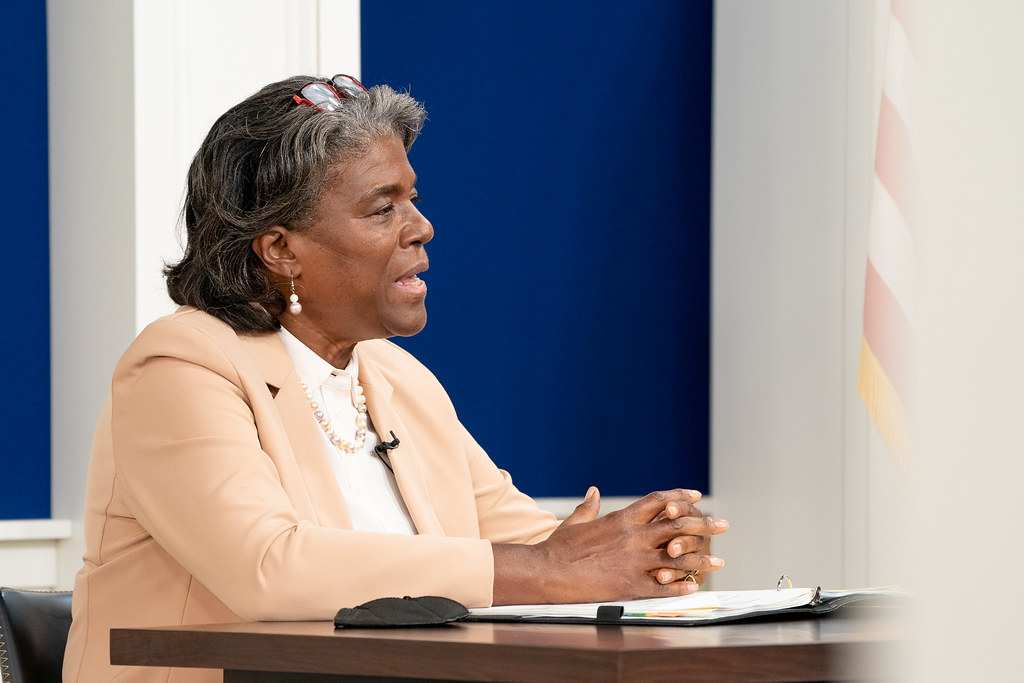We support our Publishers and Content Creators. You can view this story on their website by CLICKING HERE.

This article was originally published by Radio Free Europe/Radio Liberty and is reprinted with permission.
The United States warned Iran at the UN Security Council on October 28 of “severe consequences” if it undertakes any further aggressive acts against Israel or U.S. personnel in the Middle East.
“We will not hesitate to act in self-defense. Let there be no confusion. The United States does not want to see further escalation. We believe this should be the end of the direct exchange of fire between Israel and Iran,” U.S. Ambassador to the UN Linda Thomas-Greenfield said.
The Security Council met after Israel struck missile factories and other sites in Iran on October 26. It was retaliation for Iran’s October 1 attack on Israel with about 200 ballistic missiles.
Iranian Ambassador to the UN Amir Saied Iravani accused Washington of being “complicit” through military support for its ally. He added that Iran “reserves its inherent right to respond at a time of its choosing to this act of aggression.”
Tehran warned earlier that Israel can expect retaliation for its attack on Iranian military sites, even as the country’s supreme leader appeared noncommittal on continuing tit-for-tat strikes between the two regional foes.
Hossein Salami, the commander in chief of Iran’s powerful Islamic Revolutionary Guards Corps (IRGC), said on October 28 that Israel will face “bitter consequences” for carrying out air strikes on Iranian territory two days earlier.
Iranian Foreign Ministry spokesperson Esmaeil Baghaei, also speaking on October 28, said that Tehran would use all available tools to respond to Israel’s attack.
Israel has said it successfully carried out “targeted and precise” retaliatory strikes on Iranian military sites on October 26.
The strikes — which came in response to an Iranian missile barrage against Israel on October 1 that itself was in response to the killing of an IRGC commander — came amid fears that Israel might launch a major attack that risked seriously escalating the possibility of all-out war between the two regional powers.
Experts suggested that the strikes gave both Israel and Iran an off-ramp to avoid a broader regional war.
Iran has said that it received warning from Israel ahead of the strikes, the latest in a series of attacks and strikes between Israel and Iran related to Israel’s ongoing retaliatory war in Gaza and Iran’s role in supporting anti-Israel militant groups in the region.
Iranian officials have insisted that Iranian defenses intercepted most of the projectiles that Israel fired on October 26 but have acknowledged that four Iranian military officers were killed in the attacks.
Speaking on October 27 to the families of the Iranian military officers who were killed, Supreme Leader Ayatollah Ali Khamenei described the Israeli action as a “miscalculation” but stopped short of calling for an Iranian response.
Instead, Khamenei called on government officials to “understand the capability” Iran had and advised that while it was wrong to “exaggerate” the impact of the Israeli strikes, it was also wrong to “minimize” them.
IRGC commander Salami was quoted by Iran’s semiofficial Tasnim news agency as saying that Israel’s military action had “failed to achieve its ominous goals.”
Salami also said the strikes were indicative of “miscalculation and helplessness” by Israel as it continues to battle the Iran-backed groups in the Gaza Strip and in Lebanon.
The Palestinian group Hamas is a U.S.- and EU-designated terrorist group that sparked Israel’s war in Gaza with a deadly assault on Israel on October 7, 2023.
Israel has also launched an air assault and invasion against Hezbollah from southern Lebanon, part of which it controls. Hezbollah is designated as a terrorist organization by the United States, while the EU blacklists its armed wing but not its political party.
Reports suggest that satellite images of the aftermath of the Israeli strikes against Iran on October 26 appeared to show damage at facilities at military bases that in the past have been linked to Iran’s secretive nuclear program and to its ballistic-missile program.
Iran has not acknowledged damage at either its Parchin or Khojir military bases, which were reportedly targeted.

 Conservative
Conservative  Search
Search Trending
Trending Current News
Current News 




